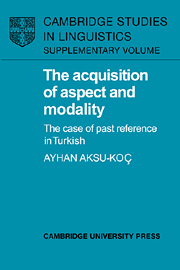Book contents
- Frontmatter
- Contents
- List of figures
- List of tables
- Acknowledgements
- Symbols and abbreviations
- PART I TENSE, ASPECT AND MODALITY IN ACQUISITION
- PART II DEVELOPMENT OF PAST REFERENCE IN TURKISH: FROM ‘PERFECT’ ASPECT TO ‘EVIDENTIAL’ MODALITY
- 4 The empirical study: rationale and hypotheses
- 5 Longitudinal study of early inflectional development
- 6 Experimental study of the production of the pasts of direct vs. indirect experience
- 7 Experimental study of the comprehension and metalinguistic awareness of the pasts of direct vs. indirect experience
- 8 Production and comprehension of the quotative function
- PART III CONCLUSIONS AND GENERAL IMPLICATIONS
- Appendix A
- Notes
- Bibliography
- Subject index
- Name index
5 - Longitudinal study of early inflectional development
Published online by Cambridge University Press: 23 September 2009
- Frontmatter
- Contents
- List of figures
- List of tables
- Acknowledgements
- Symbols and abbreviations
- PART I TENSE, ASPECT AND MODALITY IN ACQUISITION
- PART II DEVELOPMENT OF PAST REFERENCE IN TURKISH: FROM ‘PERFECT’ ASPECT TO ‘EVIDENTIAL’ MODALITY
- 4 The empirical study: rationale and hypotheses
- 5 Longitudinal study of early inflectional development
- 6 Experimental study of the production of the pasts of direct vs. indirect experience
- 7 Experimental study of the comprehension and metalinguistic awareness of the pasts of direct vs. indirect experience
- 8 Production and comprehension of the quotative function
- PART III CONCLUSIONS AND GENERAL IMPLICATIONS
- Appendix A
- Notes
- Bibliography
- Subject index
- Name index
Summary
The present chapter presents findings from the longitudinal observation of three children. This part of the study addresses the questions of the order of acquisition of the -DI and -mlş inflections, the functions they serve in the child's speech, and the gradual structuration of the semantic domain governed by the -mlş form in particular. First, the procedures for the study are described, and then the results are presented. Finally, the findings are discussed in relation to the hypotheses.
Method
Subjects
The sample consisted of three children, two girls and a boy, who were between the ages of 21 and 24 months at the beginning of the study. They came from middle-class families in Ankara with comparable socio-economic status, as judged from the occupations and income levels of their parents. The subjects were close in age but differed in terms of their level of language development. In this respect they fell on three different points on a developmental scale, as measured by Mean Length of Utterance (see section 5.1.2.). By the end of the study, the subjects overlapped both in terms of age and linguistic competence. Thus, the developmental period between 21 months (1.9 years) and 30 months (2.6 years) is represented in the data. The boy (YK) and the older girl (SÖ) were the only children of their families, whereas the youngest girl (ES) had an older sister two and a half years her senior.
- Type
- Chapter
- Information
- The Acquisition of Aspect and ModalityThe Case of Past Reference in Turkish, pp. 65 - 104Publisher: Cambridge University PressPrint publication year: 1988



